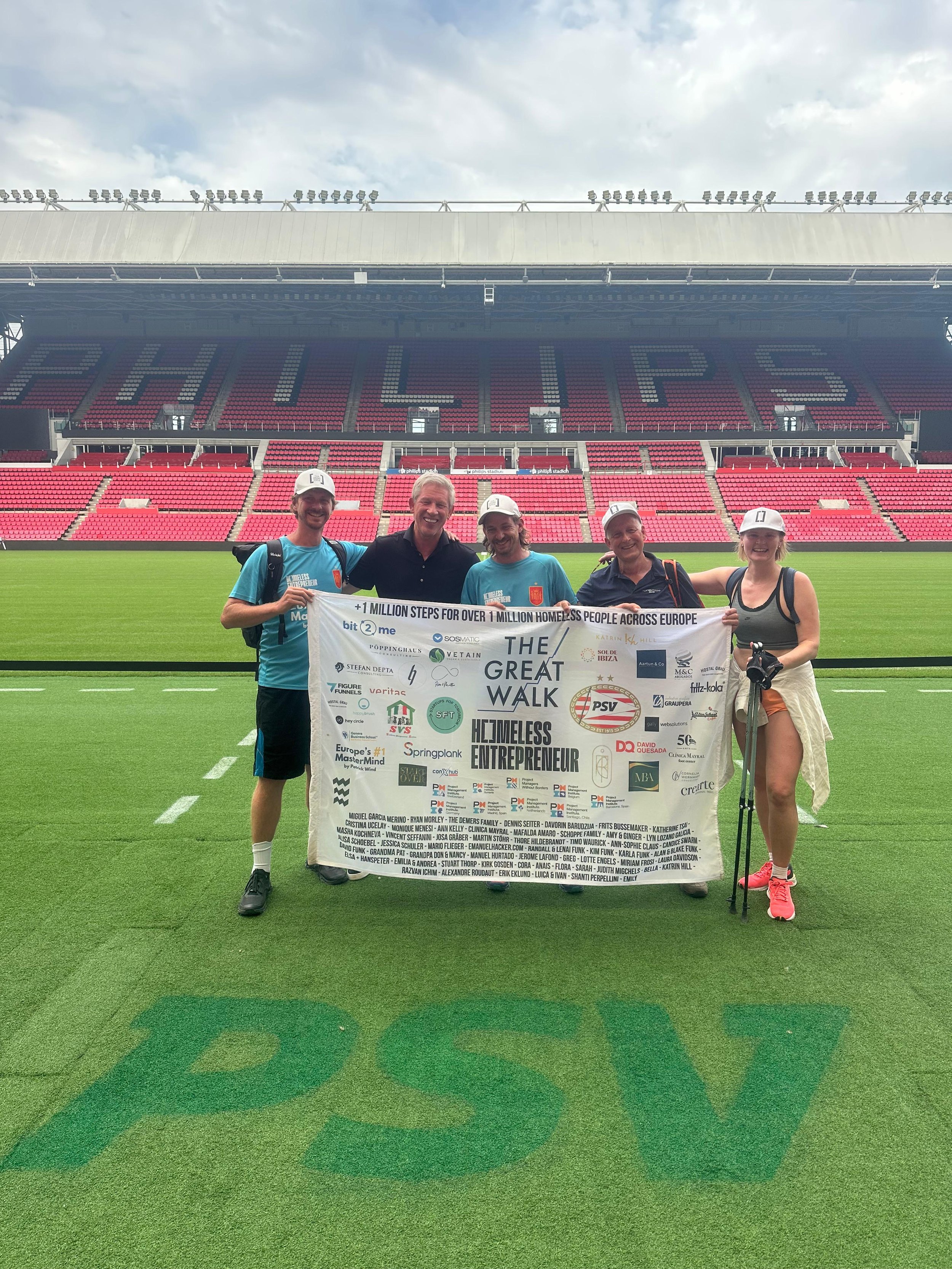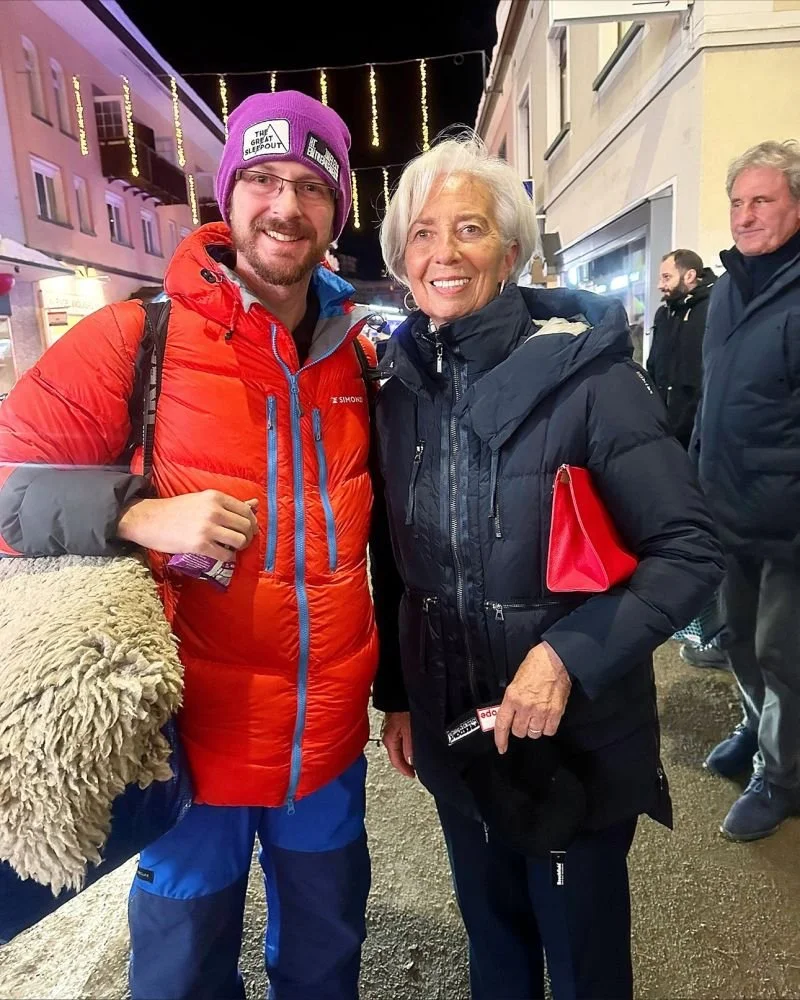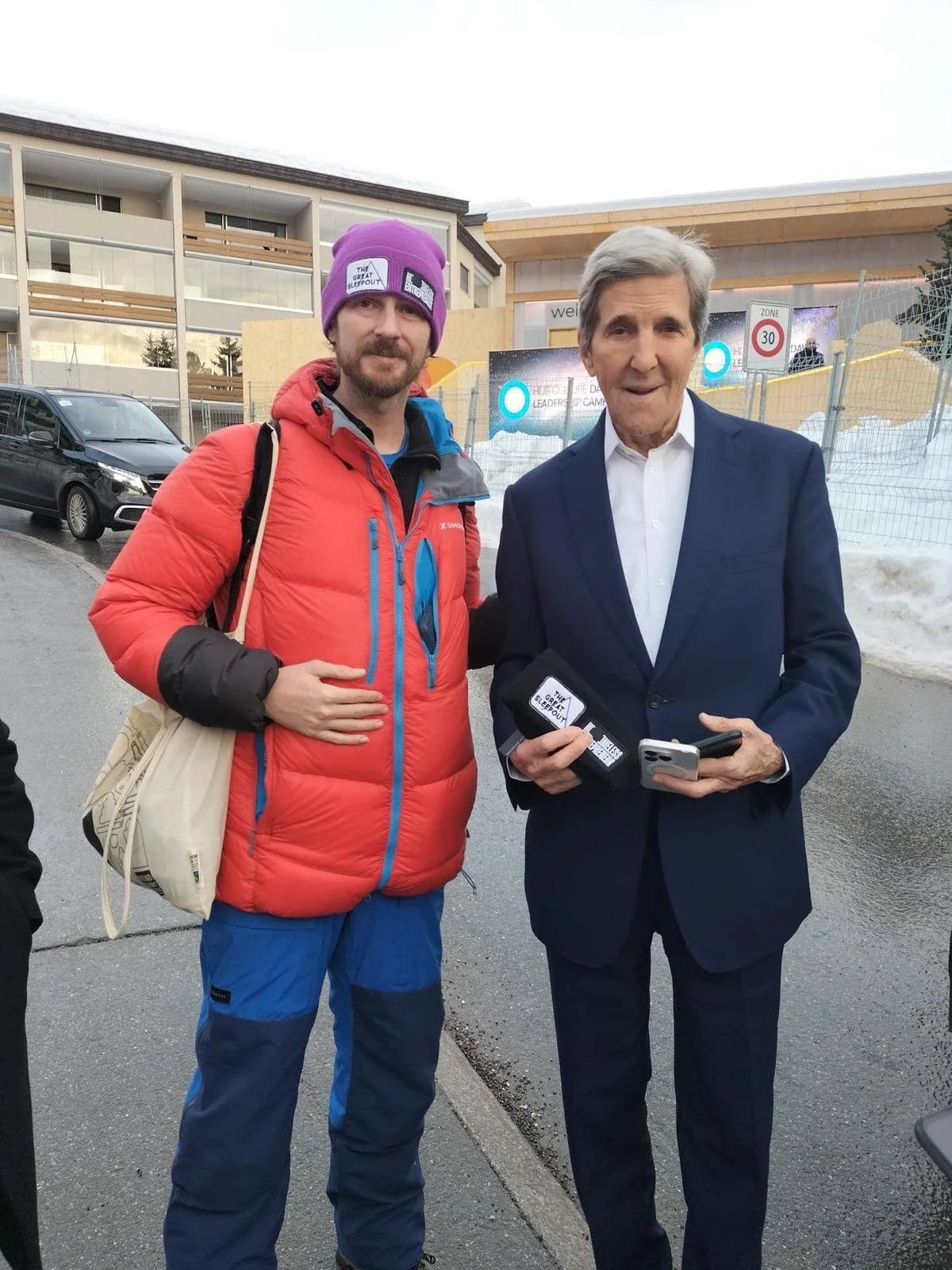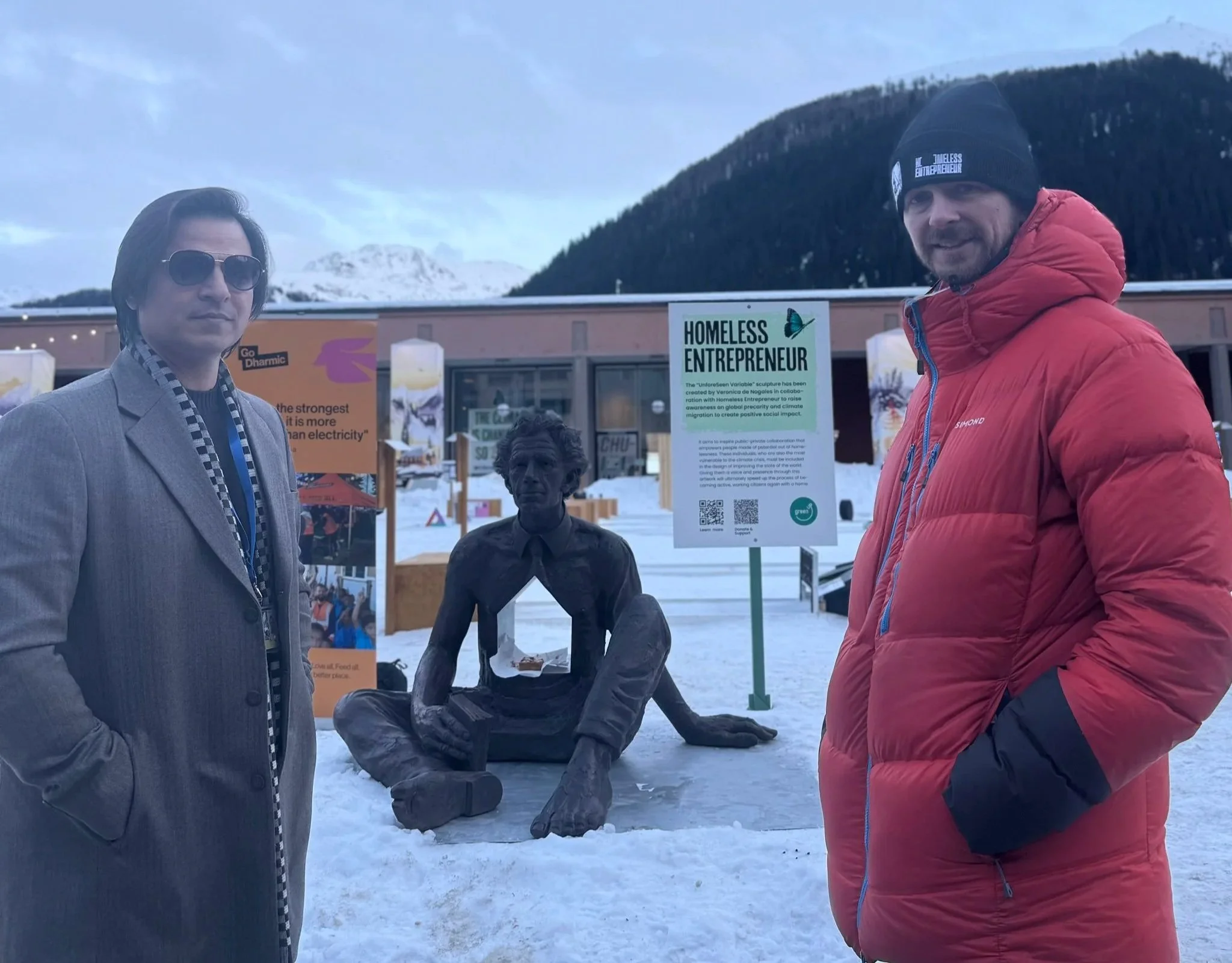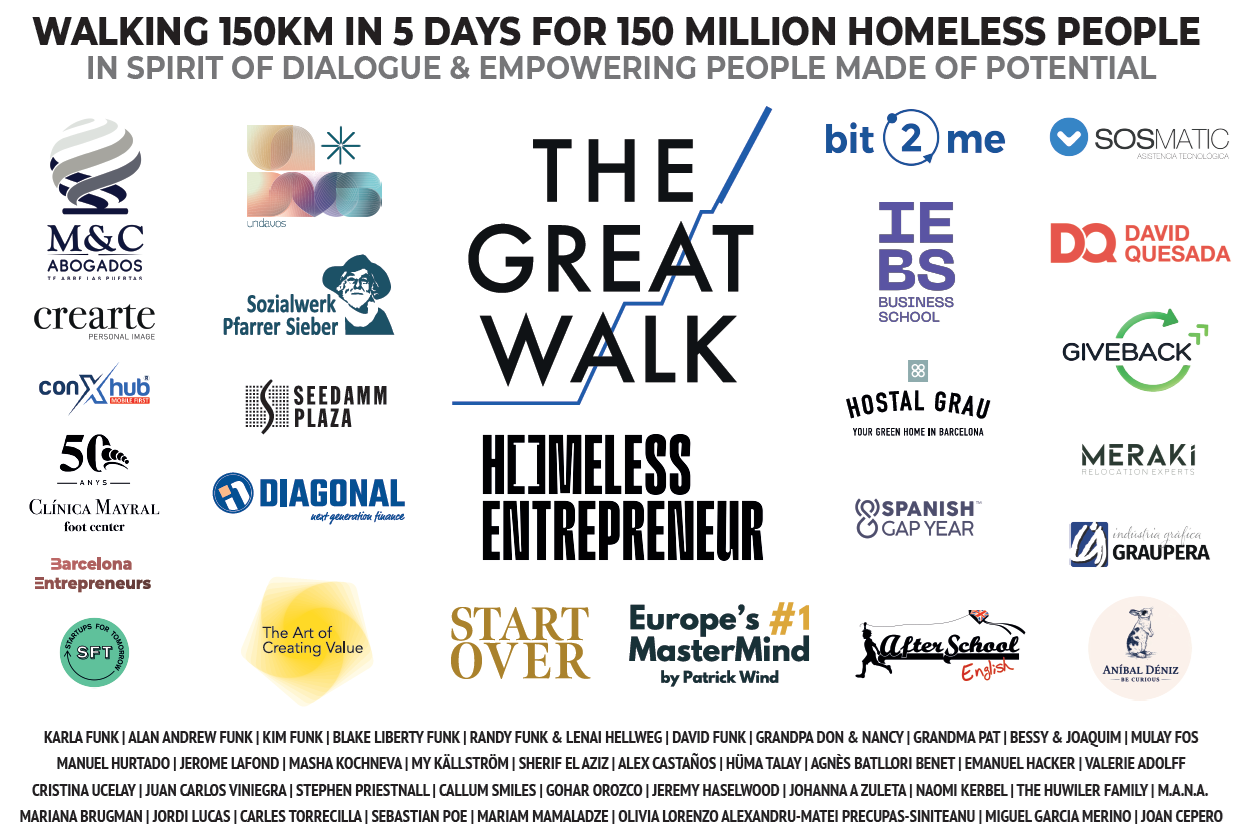Some say pictures speak louder than words, so we've decided to put that to the test, so everyone can see how we've sped up the process of empowering people made of potential out of homelessness via sustainable work and active citizenship for and with homeless people in our main programs once again in 2025 thanks to our growing international community.
January
The 3rd edition of The Great Walk, which is an epic 150 km walk to give a voice and presence to the 150 million homeless individuals worldwide, was successfully improved and completed thanks to PMI Barcelona’s support. Every kilometer we walk represents 1 million people made of potential experiencing homelessness. We started in Zurich, Switzerland and finished in Davos to coincide with the World Economic Forum Annual Meeting. Homeless Entrepreneur celebrated our 7th annual WEF Sleepout in Davos in our effort to empower people made of potential out of homelessness thanks to public-private partnerships.
Thanks to the international sculptress, Veronica de Nogales, we were able to present her beautiful sculpture, The Unforeseen Variable, which was placed at the plaza of culture in Davos thanks to the permission of the city’s mayor, Philipp Wilhelm.
February
In late October/early the cold drop in Valencia, Spain affected more than 300,000 people.
Homeless Entrepreneur provided the following support to aid those who lost their homes:
Rapid needs assessment
Structured support framework through our main programs: Helpline (+34 697 877 089), Voices and HELP program.
Volunteer mobilization and skill matching
Knowledge transfer and empowerment
Collaboration and resource alignment
Fabio Betancourt, a Homeless Entrepreneur, wrote the president of Spain, Pedro Sanchez, to show our support and commitment to the homeless community during this crisis and proudly received an official reponse in February.
March
Our Volunteer network is amazing!
Thanks to Vincent Steffanini, Homeless Entrepreneur not only got access to participating actively in The World Mobile Congress, we also got a meeting with Jonathan Hoffman (CEO and Director for GSMA Ltd) and Eulàlia Ripoll (Head of Business Spain for GSMA Ltd.
April
Homeless Entrepreneur celebrates the founder.coffee event on the second Tuesday of each month from 9h30-10h30 at Kafeta (see location) in Barcelona, Spain.
This founder.coffee event is designed for socially conscious founders who want to network and exchange ideas and opportunities to overcome obstacles while building their business and creating social impact with other like minded founders.
May
Every Homeless Entrepreneur (HE) has the opportunity to become an ambassador of his or her own project or an existing one.
Pablo Aramayo, a Homeless Entrepreneur, promotes the HE Celebrity campaign, where he interacts with famous people to raise awareness on homelessness and how to empower people made of potential.
One of the people he met with this year was Richard Gere, who is also actively supporting the homeless community.
June
Speaking at conferences around the world and partnerships are empowering people made of potential out of homelessness in our community.
We closed an agreement with the Start Over Movement by Marco Robinson to unite #1 best selling authors with Homeless Entrepreneurs and spoke in their event in Dublin, Ireland as our first step together.
July
Thanks to project management, Homeless Entrepreneur is developing our solutions and empowerment based-model through knowledge to drive positive social change. Volunteers—experienced project managers—bring PMP methodologies to our programs and projects to improve our structure, collaboration, and wider impact. A proper framework reduces costs and expands reach, enabling more people to receive support.
A huge shout out to all of the Project Management Institute (PMI) chapters that supported The European Heat Aid Great Walk this summer.
August
The European Heat Aid Campaign by fritz kola x Homeless Entrepreneur ran in Vienna (Aug 2–3), Brussels (Aug 16–17), and Madrid (Aug 30–31, 2025). Volunteers, donors, and partners joined to raise awareness about extreme heat’s impact on homeless people and to connect individuals to local helplines and resources. The program emphasized climate justice, safety, and opportunities for homeless people to become active, working citizens again, while providing routes, contact points, and a dedicated WhatsApp group for real-time coordination.
The European Heat Aid Great Walk was the most ambitious Great Walk to date: +1,000,000 steps for more than one million homeless people in Europe: 880km.
We walked through Austria, Germany, The Netherlands, Belgium and Spain.
One of the highlights was being received at the PSV Eindhoven stadium by their president, Marcel Brands, where we inaugurated our presentation in their VIP lounge.
Marcel Brand, president of PSV Eindhoven and some of the Great Walkers at Philip’s Stadium.
September
Homeless Entrepreneur was introduced to a raising star in the film industry: Miles Blayden-Ryall thanks to a community member.
In collaboration with his documentary called HOME, which explores the impacts of displacement & homelessness via one person's extraordinary story (Alen), Homeless Entrepreneur will be empowering at least one person out of homelessness while promoting this exceptional documentary film to show how the film industry can create direct social impact.
October
One of many success stories. Montse in Barcelona.
1 October 2025: Montse’s sister contact us through our Helpline (+34 697 877 089).
13 October 2025: Montse finds a home thanks to our Voices program via Instagram.
26 October 2025: Montse starts a job at Amazon for the holiday season and makes more per month that she’s ever made in her life!
November
Homeless Entrepreneur partners up with The Wellbeing Economy Wales (Cymru) to carry out the 6th Great Walk through South Wales to the Festival of Ideas in Swansea.
The Great Walk Towards a Wellbeing Economy event (Nov 7–11, 2025) took 150km from Barry to Swansea to listen to Welsh communities about what a wellbeing economy means in their lived experience with findings feeding into the Festival of Ideas on November 12. Across five days and five communities, participants walked through coastal towns and industrial heritage sites, inviting broad public involvement and dialogue on how Wales might redefine success beyond GDP.
December
Education empowers people out of homelessness.
Not everyone can say they experienced homelessness on Skid Row in Los Angeles, California and even less that they graduated university to get off the streets while living there.
Andrew Lexington, a American Homeless Entrepreneur, proudly graduated from Southern New Hampshire University and got off Skid Row in December.
Everyone experiencing homelessness deserves to smile that he is for this picture =)
Summary
Thanks to everyone who has been involved, we've provided support to +3,500 beneficiaries in our main programs to date and hope to have empowered +4,500 people made of potential experiencing homelessness in our programs by the end of 2026.
Special Thanks to our Collaborators, Partners & Support Network who EMPOWERED PEOPLE MADE OF POTENTIAL OUT OF HOMELESSNESS WITH US IN 2025!
We’d like to thank everyone who have placed their trust in Homeless Entrepreneur by interacting with us and supporting our work and most importantly our beneficiaries in 2025 because it wouldn’t be possible without them!
PMI Chapters: Barcelona & Madrid (Spain), Germany, The Netherlands, Romania, Belgium, Switzerland, Portugal, Santiago (Chile), Sydney (Australia) et alia.
We need your support for 2026!
If you appreciate our work and would like to help support us, please do.
A donation that comes from your heart, which is coherent with your interest and possibilities is the difference between more or less homeless people made of potential becoming empowered out of poverty.
A huge hug,
Andrew Funk
Founder President of Homeless Entrepreneur


